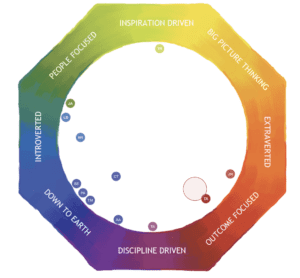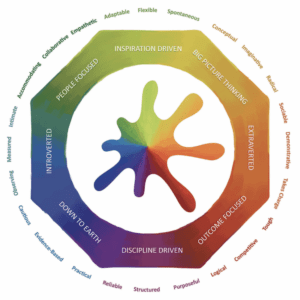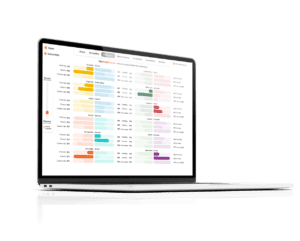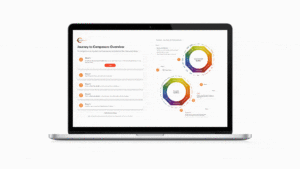Practitioner Spotlight 03 features Clare Winter, a Leadership Coach from Celox Coaching.
Clare was one of our first Lumina Spark Practitioners to participate in our virtual qualifications last year.
A firm believer that the ability to communicate effectively is at the heart of strong leadership and high performance, in this article, Clare uses her experience of participating in the Clipper Round the World Yacht Race in 2016 to highlight how Lumina Spark can be used to enhance our communication skills.
Performing under pressure
I’m on a 70 foot racing yacht with 15 other people in the middle of the ocean. We’re two weeks into a four week non-stop race from Seattle to Panama. We’re in the middle of the pack – a few days ago we were in the lead. It’s 30 degrees on deck and 40 degrees below deck, sleep is at a premium and we’re tired. After two weeks living in close proximity with others, we know each other very well, there is no gloss any more. And yet there is a difference between knowing each other very well and communicating and performing well.

Clare and her fellow crewmates en route to New York
Understanding ourselves and others, and finding ways to communicate effectively with each other is the key to creating a happy boat. Happy boats are high performing boats.
Looking around at my crew I observe that:
- Rachel is very direct and matter of fact in her approach to everything.
- Brian is very quiet when all the crew is together, but on the night watches, when there are fewer people around and there is generally less going on, he can be very chatty.
- Sam likes to take his time with things to understand them fully.
- Jane is always very upbeat and talkative. She keeps everyone entertained.
- George, one of the watch leaders, likes to keep everyone involved in things.

The Lumina Team Viewer visualises how personality, preferences and communication differ among individuals in teams
There is a wide range of personalities and everyone has different communication preferences. How do we ensure that we compliment each others’ differences and bring out the best in each other, rather than let our differences cause clashes that hamper our performance and make living together in a confined space a miserable experience?
Forming, storming, norming, performing
Operating in a high performance environment, in close proximity to others 24/7 for weeks on end with no let up allows team members to see the strengths and understand the communication preferences of both themselves and others. It gives time to understand these preferences and how to accommodate them to build rapport, develop as a team and improve performance. This, however, can be a volatile process as team members push boundaries and their personalities clash.
In 1965, psychologist Bruce Tuckman described the process of “forming, storming, norming, and performing” in his paper, “Developmental Sequence in Small Groups”[1]. It describes the path that teams follow on their way to high performance. In the storming stage, team members start to push against established boundaries and conflict can arise as their true characters emerge and they clash with others.
How can this storming stage be shortened or avoided?
Due to the intensity of the environment we found ourselves in on the boat, we were able to rapidly understand each other’s personalities and how to work with each other, but in a work environment, organic rapid assessment opportunities rarely present themselves and even if they do arise, understanding how best to utilise the insights gained can be tricky.

Lumina Spark Mandala – 24 Qualities & 8 Aspects, 3 Personas
This is where Lumina Spark comes in. Through its profiling of the 24 Qualities, 8 Aspects and 3 Personas, it provides a detailed understanding of who we are and how we like to be. It then provides the added lens of how we can use this knowledge to speed read and interact with others to build rapport and communicate effectively. All of this knowledge and understanding is further brought to life for Practitioners and users in the Lumina Splash App and the downloadable workshop resources available in Lumina Learning’s Resource Library.

Lumina Spark’s Three Personas – showing how our behaviour shifts between Underlying, Everyday and Overextended
Back on the boat
It’s coming to the end of a very busy 2am to 6am watch and everyone is feeling exhausted. We’re packing away one of the sails, a task that needs clear communication and team work. George should be leading the task but instead everyone is doing their own thing and it is a bit chaotic. Looking around, Rachel demands to know “Who is actually leading this?”. George, who, in his tiredness has moved from being Collaborative to being Consensus Obsessed, says, “We’re all doing it together, it’s fine”. Rachel notes that this approach is clearly not working and tells George to lead the task. George looks a little scolded, but he takes charge of the, now quiet, crew and the sail is quickly packed away.

Whilst participating in the Clipper Round the World Yacht Race in 2016, Clare experienced the impact of understanding and complimenting each other’s differences
The task is completed but relations between Rachel and George are frosty for a little while. Rachel is irritated by the fact that George’s desire to make everyone feel included is preventing him from leading the crew through simple tasks. George can’t understand why Rachel had a go at him when he was just trying to make sure that he was bringing everyone along with him.
How could this ill-feeling have been avoided?
Armed with knowledge gained from Lumina Spark, we can understand how best to effectively communicate with the crew:
- Rachel is comfortable with conflict, and courageous enough to tackle difficult conversations (Tough). When talking to her, we need to say it like it is and not put a gloss on things. We may feel uncomfortable but we shouldn’t worry about being rude. Equally, we shouldn’t take offence at her directness. If he had understood this about Rachel, George would have realised that she was not personally attacking him in the above situation.
- Brian listens first and gravitates towards one to one conversations (Intimate). We should engage with him on a one to one basis and provide him with the support he needs to feel comfortable in larger groups.
- Sam is private and likes to think before he speaks (Observing). Despite our potential urge to get things done quickly and efficiently, we should give him the time and space he needs to observe, understand and process what is happening and what his response is going to be.
- Jane is enthusiastic and expresses positive emotions (Demonstrative). We should give her the space she needs to express herself, allow her to talk and show her enthusiasm.
- George is a team player who likes to make sure that others are supported and acknowledged (Collaborative). We should show him how our actions are win-win for everyone and make sure that we include everyone. In the scenario above, if Rachel had taken the time to explain to George how everyone would benefit from some clear direction, she could have avoided upsetting George whilst still ensuring the task was completed efficiently.
In tailoring our communications in this way, they become more effective and we will see better results.
Team working remotely
Now, more than ever, as we navigate our way through the Covid-19 pandemic and what it means for our teams and organisations, effective communications are crucial.
Teams are working remotely. Individuals are no longer able to read body language as easily as before. Idle conversations walking to meetings no longer happen. The world of work is changing rapidly and often unpredictably (which the team at Lumina have been researching). It is in this context that Lumina Spark comes into its own. It is an invaluable tool providing individuals with the ability to speed read others and tailor their communications accordingly. Even better, Lumina Spark’s various features are offered virtually, resulting in the means and the impact of virtual development being immediately available at a time when it is needed most.
Three New Lumina Learning features I’d recommend for developing effective communicators

- Spark Coach – an interactive online exploration of the Lumina Spark assessment that brings personality to life across the 24 Qualities,
8 Aspects and 3 Personas.

- Journey to Composure – Lumina Spark’s virtual deeper dive into the Overextended persona, focusing on creating more adaptable, resilient people who can perform at their best no matter what.

- Resource Library – contains downloadable workshop slides, worksheets and guidance on running interactive, engaging virtual sessions.
Get in touch with Clare and Celox Coaching

If this has sparked your interest and you would like to use Lumina Spark to help you and your team communicate more effectively, then please get in touch with me.
Subscribe here to explore more benefits of effective communication.
References
[1] Tuckman, B. W. (1965). Developmental sequence in small groups. Psychological Bulletin, 63(6), 384–399.
Read other Interviews
Get in touch with us
